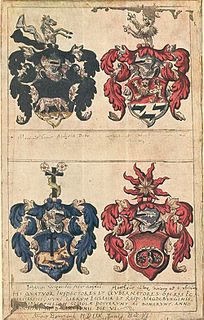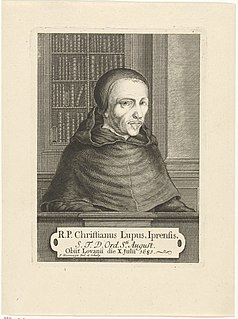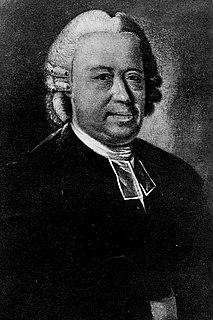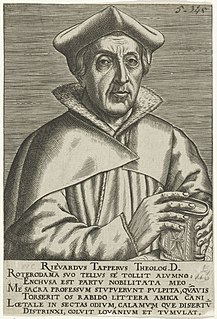Sources
 This article incorporates text from a publication now in the public domain : Herbermann, Charles, ed. (1913). "G. Henry Wouters". Catholic Encyclopedia . New York: Robert Appleton Company.
This article incorporates text from a publication now in the public domain : Herbermann, Charles, ed. (1913). "G. Henry Wouters". Catholic Encyclopedia . New York: Robert Appleton Company.
G. Henry Wouters was a Flemish church historian who regarded ecclesiastical history as an auxiliary science to theology.
He was born in Oostham in Belgian Limburg on 3 May 1802; died on 5 January 1872. In 1829 he became professor of moral theology, and later also of ecclesiastical history at the University of Liège.
At the reorganization of the University of Leuven in 1834 he became professor of ecclesiastical history to the faculty of theology, which post he filed until 1871. His successor at Leuven was Bernard Jungmann.
The first edition of his Historiae ecclesiasticae compendium appeared in three volumes (1842–43). In its time it had wide renown, and became a classical handbook in many countries.
It was supplemented by the Dissertationes in selecta historiae ecclesiasticae capita, four volumes (1868–72), which was to deal at greater length with controversial questions from the earliest times to the Council of Trent, but which stopped at the fourteenth century.
He drew his inspiration from Baronius, Antoine Pagi and Noel Alexandre.

Johann Salomo Semler was a German church historian, biblical commentator, and critic of ecclesiastical documents and of the history of dogmas. He is sometimes known as "the father of German rationalism".

The Abbey Church of Saint Peter and Saint Paul, Shrewsbury is an ancient foundation in Shrewsbury, the county town of Shropshire, England.

Johann Lorenz von Mosheim or Johann Lorenz Mosheim was a German Lutheran church historian.

John McClintock, American Methodist Episcopal theologian and educationalist, was born in Philadelphia.
William Cave was an English divine and patristic scholar.

Enrique or Henrique Flórez de Setién y Huidobro was a Spanish historian.

Noël Alexandre, or Natalis Alexander in Latin was a French theologian, author, and ecclesiastical historian.

The Magdeburg Centuries is an ecclesiastical history, divided into thirteen centuries, covering thirteen hundred years, ending in 1298; it was first published from 1559 to 1574. It was compiled by several Lutheran scholars in Magdeburg, known as the Centuriators of Magdeburg. The chief of the Centuriators was Matthias Flacius. Lutheran theologian Werner Elert argued that due to its revolutionary critical method of presenting history, it is the basis of all modern church history.
Bernard Jungmann was a German Catholic dogmatic theologian and ecclesiastical historian.
Gerald John Pillay is a South African theologian and ecclesiastical historian. He has been Vice Chancellor and Rector of Liverpool Hope University in England since 2003.

Thomas Stapleton was an English Catholic controversialist.

Christian Lupus was a Flemish theologian and historian.

Jacobus Trigland (Triglandius) was a Dutch Reformed theologian. After the Synod of Dort of 1618–19, he worked and wrote against the Remonstrants.
Honoratus a Sancta Maria (1651–1729) was a French Discalced Carmelite, known as a prolific controversialist. His secular name was Blaise Vauxelles, and he was known also by the French version of his name in religion, Honoré de Sainte-Marie.

Christian Wilhelm Franz Walch was a protestant German theologian and professor of theology from Göttingen. He authored numerous books.
Mary-Anne Plaatjies van Huffel was a South African pastor and academic. She was the first female minister to be ordained by a Dutch Reformed Church in Southern Africa.
Ernst Christoph Philipp Zimmermann was a German classical philologist and theologian. He was the brother of theologian Karl Zimmermann (1803–1877).

Ruard Tapper was a Dutch theologian of the Catholic Reformation, a chancellor of Leuven University, and an inquisitor.

Johann Georg Lairitz was a German theologian, born at Hof in Bavaria. In 1667, he entered the university at Jena; in 1677, he graduated with a M.A., and in 1673, became professor of Church and profane history at the gymnasium of Baireuth. In 1675, he became librarian and instructor of the margraves Erdmann Philipp and Georg Albrecht; in 1685, he became deacon of the court Church; in 1688, he became superintendent at Neustadt. In 1697, he accepted the call of the duke Wilhelm Ernst of Weimar, and he then became superintendent in general, counselor of the consistory, first preacher of the Petri-Paul Church, and director of the gymnasium.
Antonio Sandini was an Italian ecclesiastical historian.